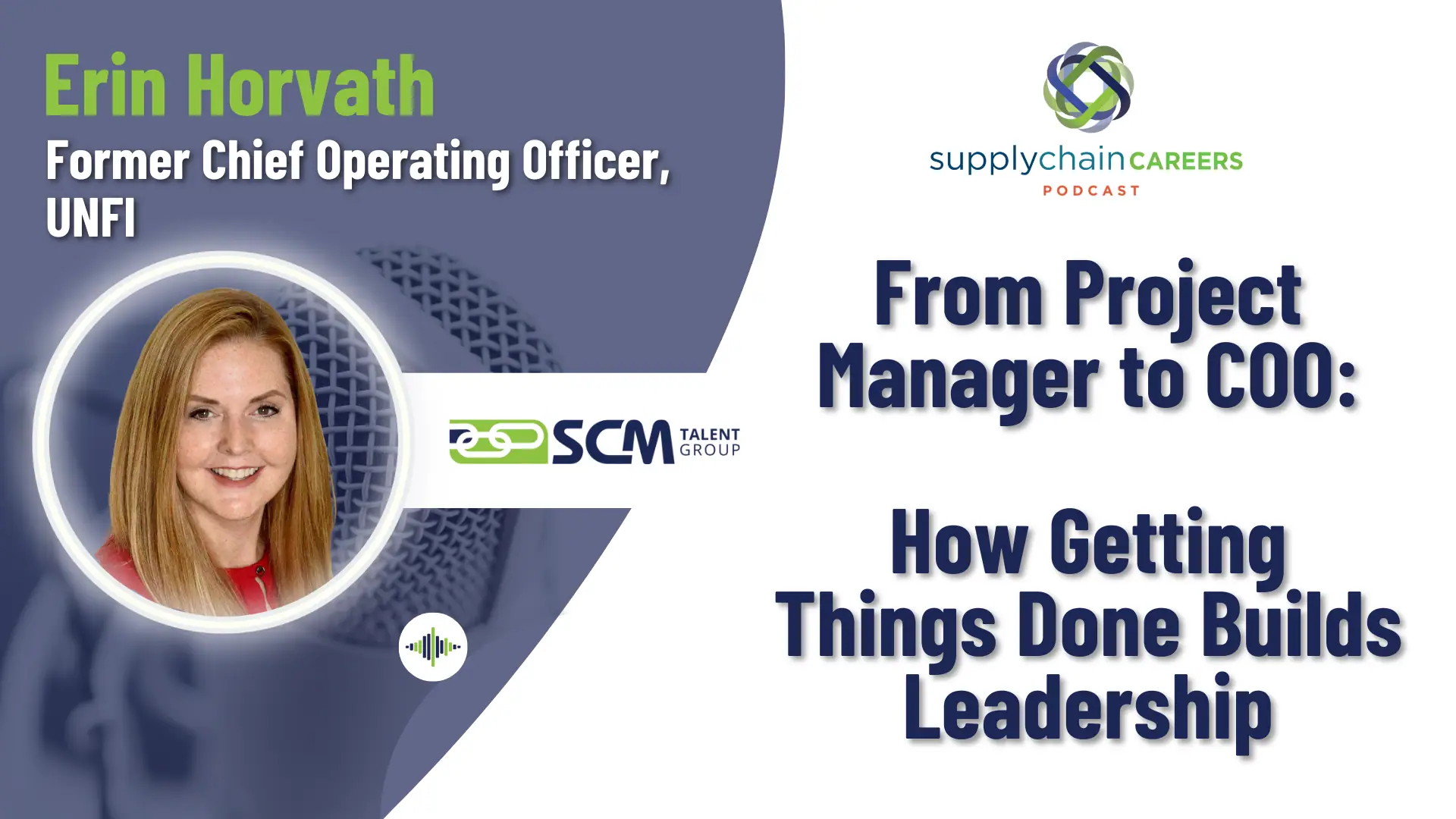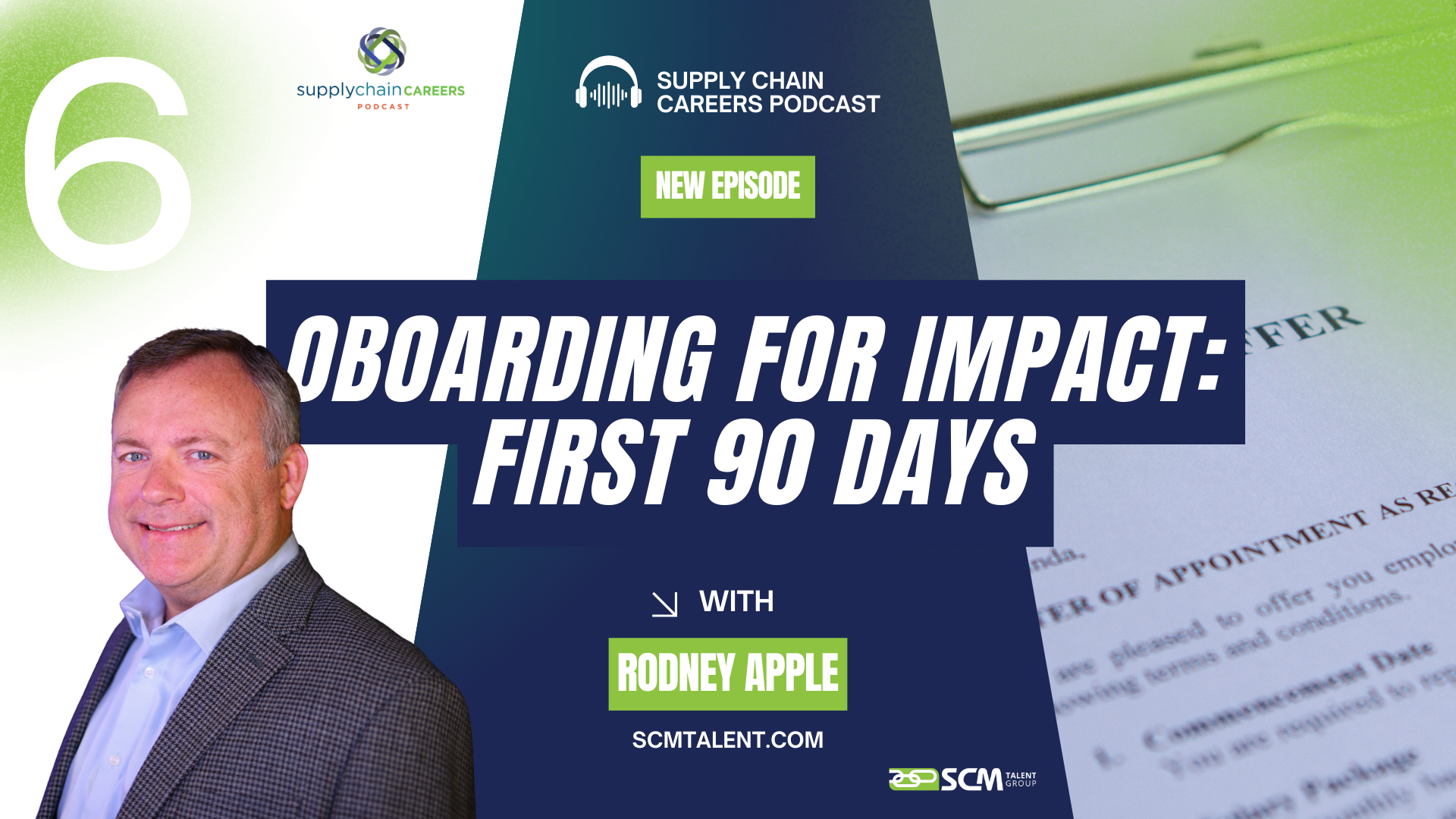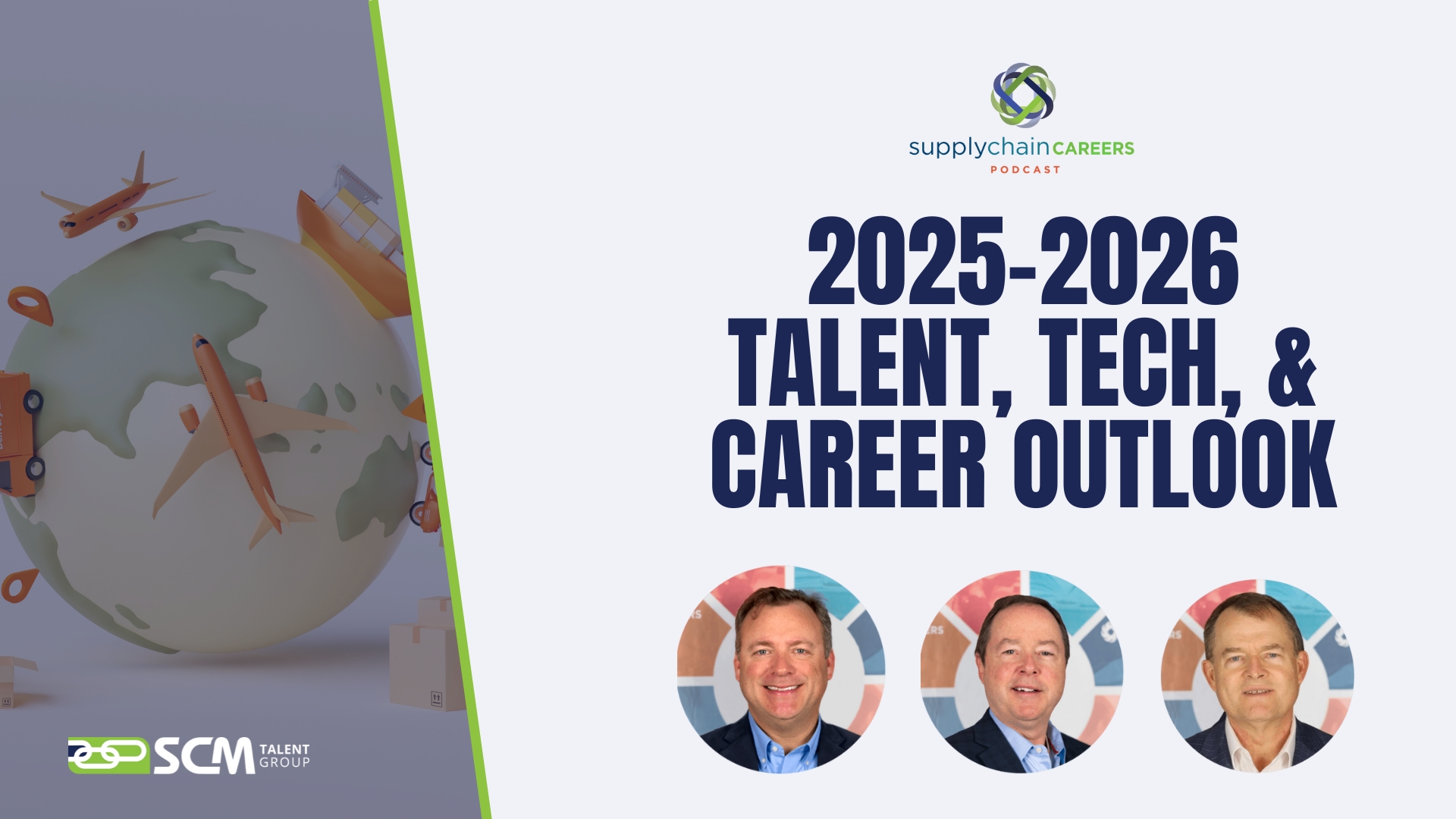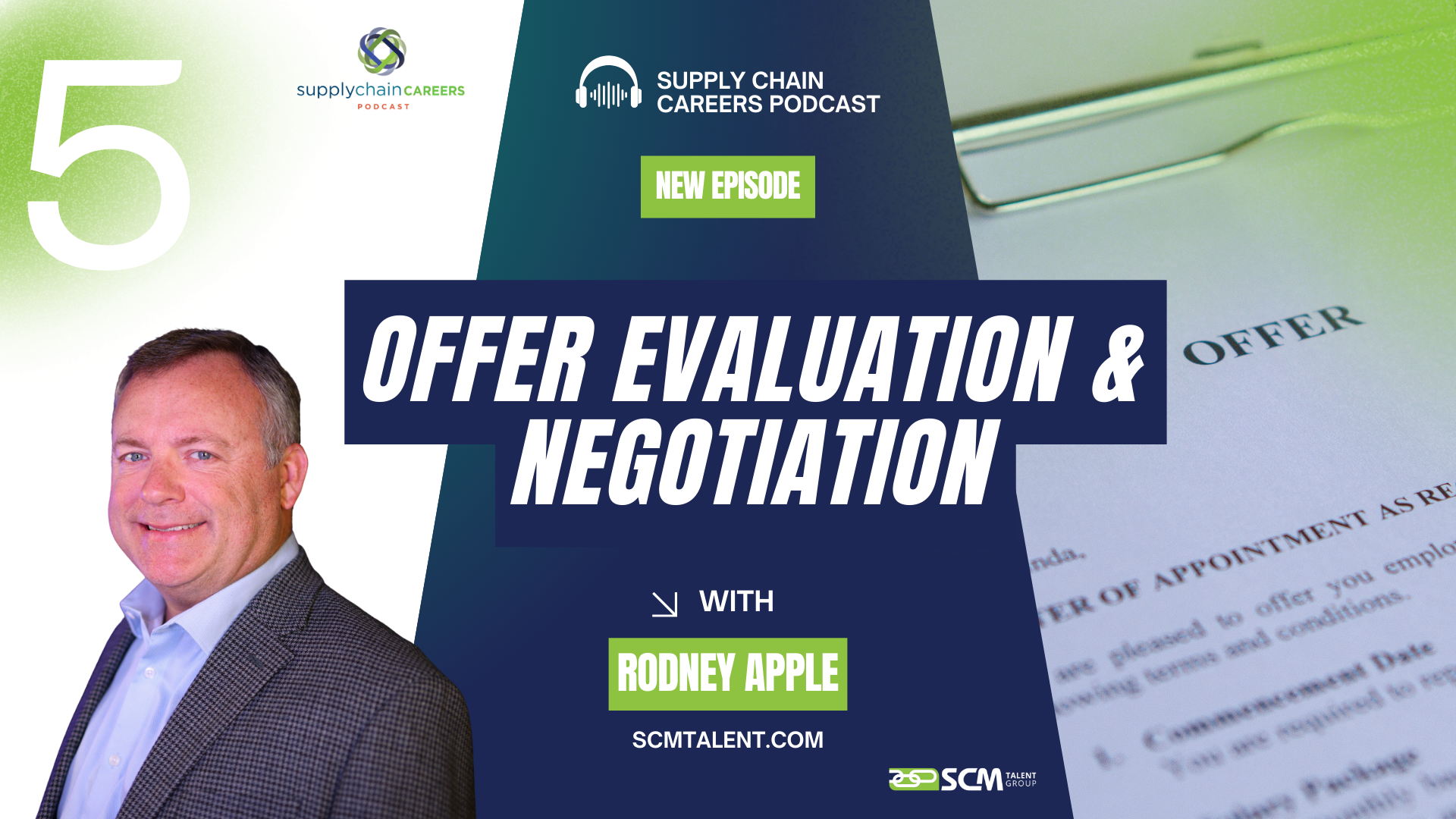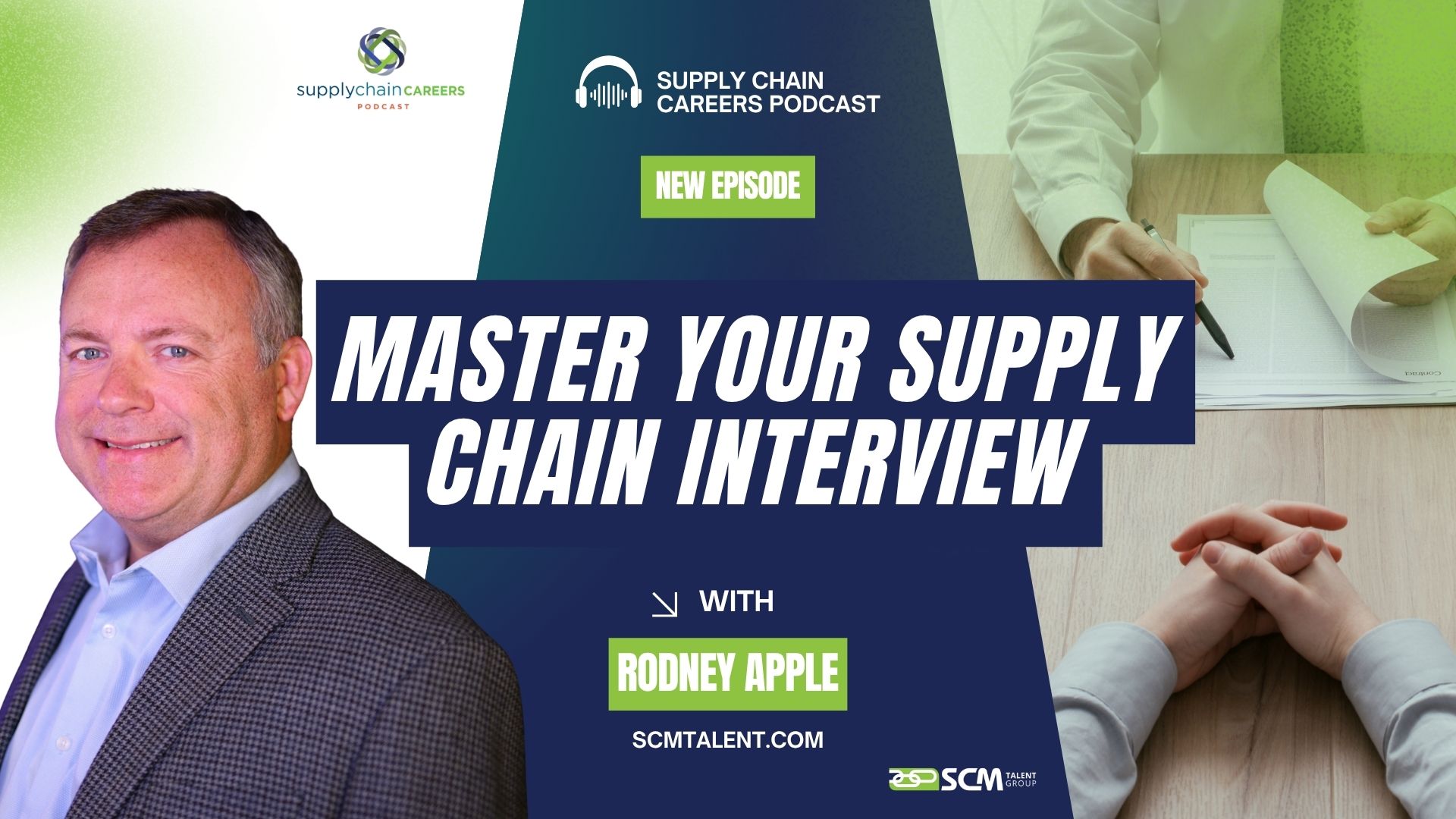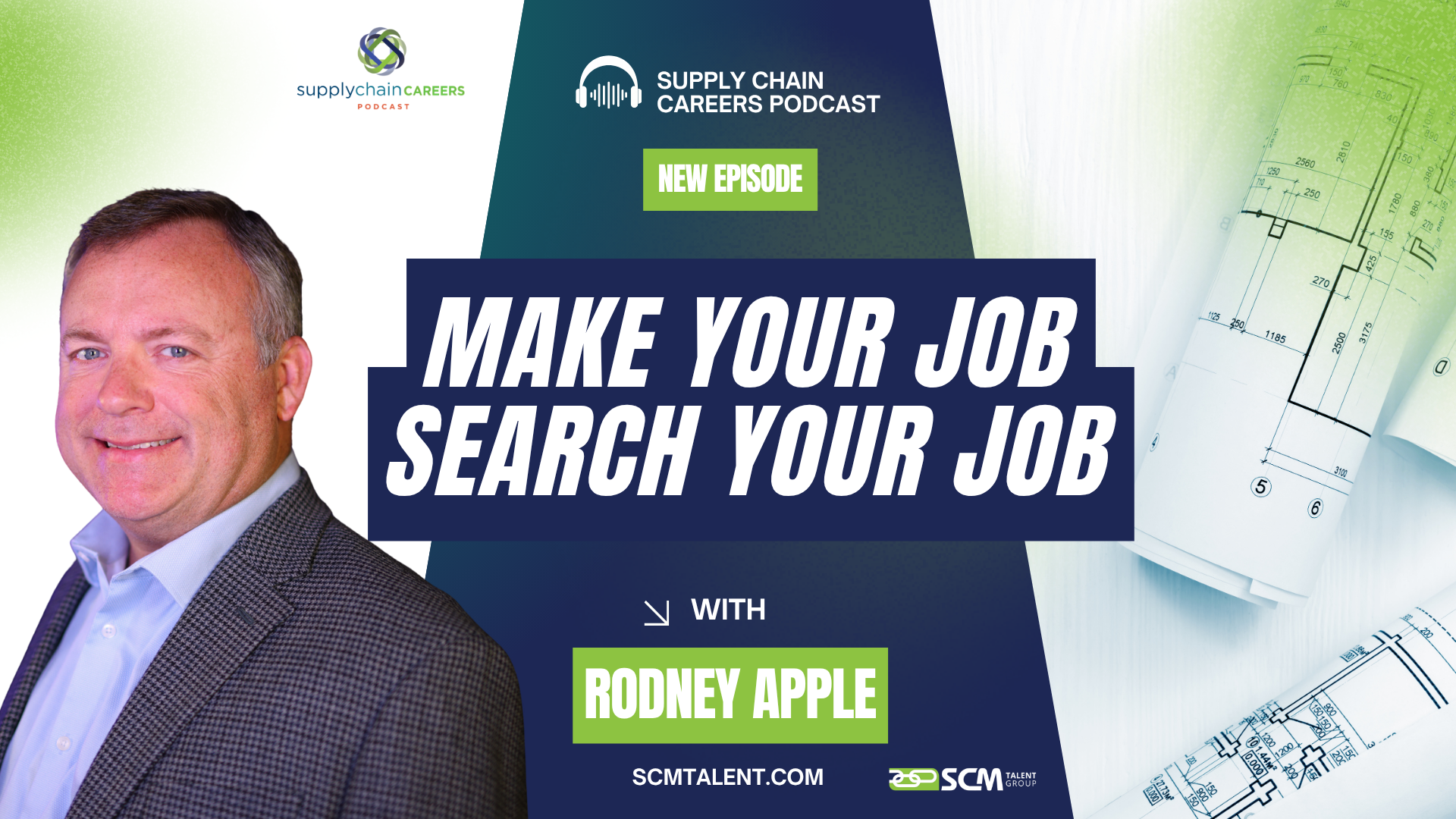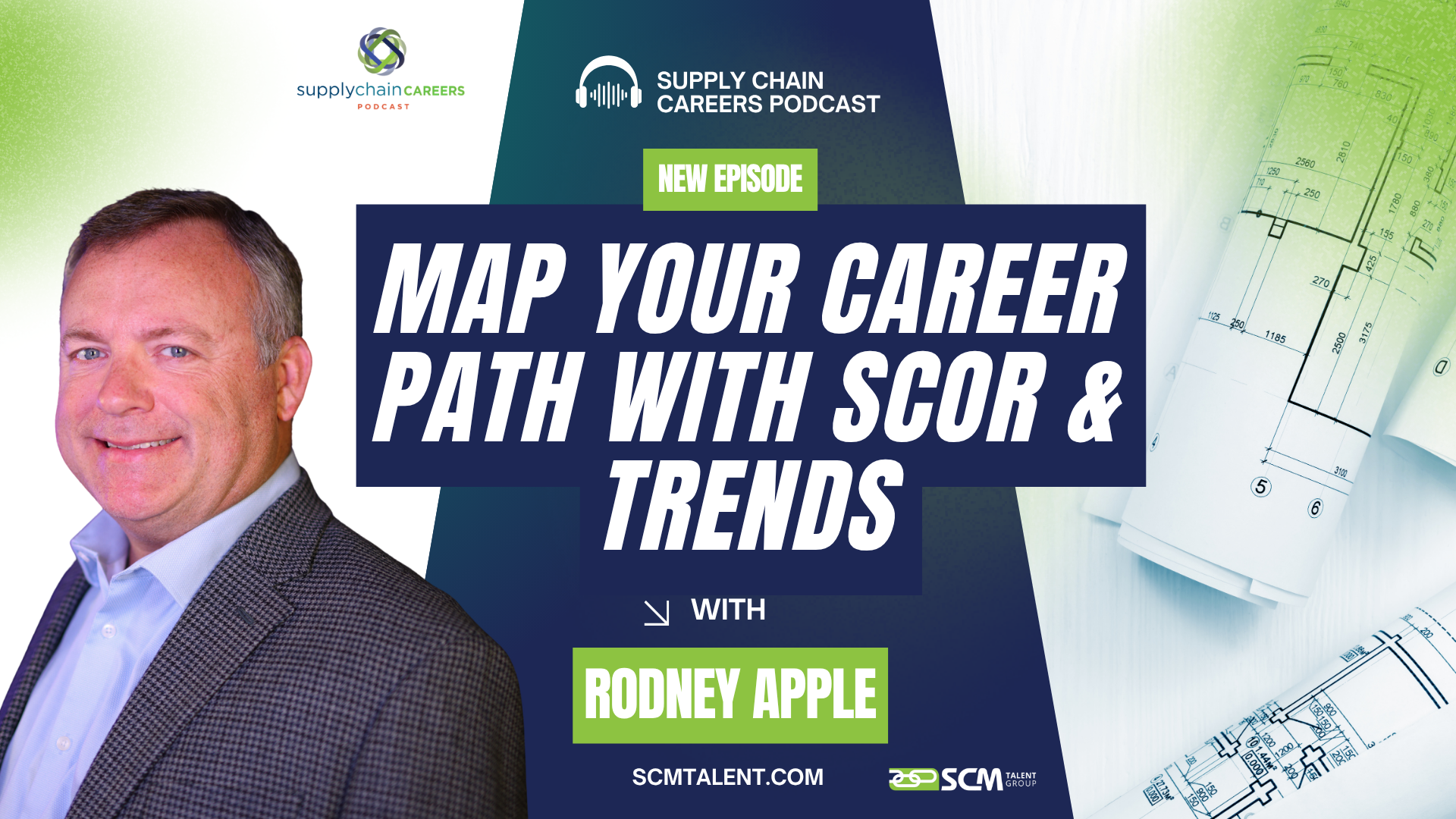[00:00:00] Mike Ogle: Welcome to the Supply Chain Careers Podcast. The only podcast for job seekers, professionals, and students who are focused on career enhancing conversations and insights across all aspects of the supply chain discipline. This podcast is made possible by SCM Talent Group, the industry leading supply chain executive search firm.
Visit SCM Talent Group at scmtalent. com. In this episode of the Supply Chain Careers Podcast, our guest is Aaron Horvath, the Chief Operating Officer at UNFI, United Natural Foods. Aaron has extensive supply chain experience. Starting in procurement and supply chain with the U. S. Navy, but Master Carr and Arthur Anderson.
Those positions provided a solid foundation for nearly two decades with Sincora and now at UNFI. Her passion as an undergraduate was finance and international [00:01:00] business, while her two least favorite classes in undergrad were operations management and management information systems. But experience in factories changed her mind and turned into a passion for supply chain and operations.
Listen as Erin describes her experiences working her way up from individual contributor to C level. Applying what she learned about how to lead. She encourages professionals to understand enterprise strategy, be curious, ask questions, look for ways to learn various parts of the business, and pick up some experience in project management.
Erin closes with her thoughts about AI, about sustainability, and about other trends she sees in the supply chain industry. I’m
[00:01:40] Rodney Apple: your podcast co host, Rodney Apple. And I’m your podcast co host, Chris Gaffney. Aaron, welcome to the supply chain careers podcast. We’re very excited to have you on the show today.
[00:01:54] Erin Horvath: Happy to be here. Thank you.
[00:01:56] Rodney Apple: So you’ve had an incredible career journey and you’ve worked in different [00:02:00] roles from consulting to information technology and quite a few C level roles. Would love to hear how you got started on your career journey, what led you to AmeriSource Virgin and United Natural Foods.
And then what triggered that moment that got you into the supply chain world?
[00:02:18] Erin Horvath: Yeah, sure, Rodney. I must confess, very early on, right off the bat, that my two least favorite classes in undergrad were Operations Management and management information systems. So my passion was really finance and international business.
I wasn’t initially attracted to supply chain, but I will tell you, probably my third job out of college, I had the opportunity to work for Arthur Anderson. And I had some procurement experience and some warehousing and distribution experience up to that point. But it was really when I started to work for clients that were in manufacturing and distribution specifically in the Lehigh Valley here in Pennsylvania, that I really got [00:03:00] attracted to type of that.
That type of work. And I don’t know if you guys remember kind of Mr. Rogers neighborhood, but my favorite part about that show is certainly dating myself now was when the trolley, I think, went to go visit the factories. And I just found that fascinating. And so when I got into consulting, it was those fond childhood memories that were brought to life.
So I would say really my consulting experience, six years of working with different clients really piqued my passion for supply chain and operations.
[00:03:29] Chris Gaffney: Aaron, one of the things that a lot of our listeners want to understand is how they progress in, in their careers in the field from a supply chain standpoint, and a lot of them aspire to the more senior roles.
As you think about advancing from individual contributor manager up into what we would say are more executive kind of roles. What were the challenges that you faced in hitting that, that next level and what did you do to overcome it? And I’m curious [00:04:00] whether there were skills that you need to acquire or just changing your mindset to make that leap and be successful at the executive level.
[00:04:07] Erin Horvath: Yeah, sure, Chris. In most companies, the annual budget is constrained, right? And appropriately. Countless initiatives that are vying for the same investment dollars. And as an executive myself, you really have to bring an enterprise mindset to prioritize the initiatives. They’re going to create the most value for shareholders while also balancing the internal needs of the organization.
Really spending the most of my career. In the areas that drive operating expense, right? We weren’t contributing to the profit. There were all these things that need to be done, right? There was software and technology that needs to be upgraded. There are automation, there’s forklifts that you need to buy, right?
So the eyes are always bigger than the stomach. And so for me, it was really understanding what is the enterprise strategy. How can supply chain and technology [00:05:00] contribute to the execution of that? And I had to make really tough choices. I had to go back to my teams and say, Hey, we’re not able to do certain things this year.
We could do X, but we can’t do Y. And it’s really making those decisions to really ensure that you can pace the long term investments. In line with margin growth in the enterprise strategy, right? You’re not operating in a silo. You just can’t you’re negotiating with your colleagues for those investment dollars.
But at the end of the day, it’s really the enterprise strategy driving value that drives that prioritization of those investments. So I would say that enterprise mindset is really key.
[00:05:37] Chris Gaffney: So I will do a follow up on this one. If you if there’s somebody who aspires and says I’m building the right career development plan, they hear that.
How do you you Learn more about that enterprise strategy when you’re in a junior role, right? And what are the things that someone can do along the way so when they finally get there, they’re better positioned to [00:06:00] think end to end in that environment.
[00:06:02] Erin Horvath: Yeah, ask your manager, right? If I’m an associate, I would ask my manager, Hey, can I see the enterprise strategy?
And most organizations, they share that with you in the town hall. It might not be the The nth degree of detail, but you’ll get a sense of what that strategy is because right, typically it’s a three year plan that’s aligned with financials, but your manager should have visibility to what that enterprise strategy is and then where within your team, whether it’s technology or supply chain, whatever the case may be, where do you, where’s that group fit into that overall strategy?
What are the key initiatives that somebody is working on? And, oh, by the way, can raise your hand, can I be a part? of one of those key initiatives that is articulated in that strategy. Just ask.
[00:06:49] Chris Gaffney: Super. Thank you.
[00:06:51] Rodney Apple: Similar question, Aaron. And we get this question a lot from our audience and especially in the recruiting world, folks that may get locked into a certain [00:07:00] function.
I’ve been working in warehousing as an example. and would like to work in procurement. How do I do that? Or I may work in one industry like food and Bev. How do I switch into pharmaceuticals? You’ve done that throughout your career. What advice would you give to someone that’s aspiring to either switch industries or switching functions?
[00:07:20] Erin Horvath: Yeah, I have spent the majority of my career in distribution. Again, as you said, Rodney, across a variety of industries, but for me, I spent the majority of my career in pharmaceutical distribution. And it was really at the point, it was after the pandemic, and I’m not going to lie, I was completely burnt out.
And I was looking for a shift. And so for me, I was looking for another distribution business that had similar day to day business processes that I could make that shift. And so for that, for me, that came through UNFI, United Natural Foods. And what was great about that is the [00:08:00] pickpack ship was consistent, but I got to learn a new regulatory industry, right?
I, I came from a heavy DEA environment to a now very strong FDA regulatory environment. How did they work? The other thing that was a bit of a shift for me is I came from more of a parcel environment in pharma or direct to hospital deliveries or direct delivery to retail environments. The retail part applied to UNFI, but in there, the quantities were different.
We were delivering. pallets and truckloads of food to like Whole Foods, right? Our largest customer. And so there were things that were similar, but things that were different. So I would say, think about adjacencies where you can take some of your experiences that you’ve learned, apply it, but also look for an opportunity to learn.
And I would just say, in terms of advice, don’t be afraid to get outside your comfort zone, right? A new industry is right for learning and it provides an opportunity to diversify your experience. And I will say diversity of [00:09:00] experience is something that’s always Always attractive to employers.
[00:09:03] Chris Gaffney: Thank you.
Uh, I’m tempted on a follow up on this one because I talk a lot about agility in the space of confidence, right? In some cases, it’s a big leap to make those. How did you leverage kind of your past experiences to say I have the goods to make this shift based on My own evidenced experience over the course of my career.
Talk to me about that a little bit.
[00:09:30] Erin Horvath: Yeah, I would just say that early in my career I spent a couple of years as a project manager and I always say once a project manager always a project manager And those skills I kid you not have served me well over the years because you’re organized. You understand risks and issues.
So there are things like that, that I always keep in my toolbox, even though I’m a COO or a Chief Transformation Officer. Organizations like when things get done. There’s strategy, and it’s great to have [00:10:00] strategy, but what is even better is strategy execution, when you can put into play and execute upon the things that you said you’re going to do.
Those are just a couple of things, Chris, that I would share from my experience.
[00:10:11] Chris Gaffney: I like it. I’m a project manager at heart, so I, You’re preaching to the choir, folks would look at your resume and say you had a couple pretty big leaps up into some pretty big leadership roles, both in operations and supply chain transformation and people want to build the foundation, but they also want to move fast with people with high aspiration.
I’m curious, in your case, Were there a couple of big decisions or a fork in the road that you took that you feel like was a big differentiator or driver of your ability to get up into some of those more senior roles?
[00:10:52] Erin Horvath: Yeah, Chris, I’ll share a next story from when I was, it started at Amerish Horsbergen and now they’re known as Sincora, they [00:11:00] just rebranded.
But I was three years into my time there and I was in IT. And I had heard at the water cooler that there was a major multi year transformation, business transformation that was getting off the ground. And the president of the largest subsidiary was going to be taken out of his role and fully dedicated to leading the business transformation.
And so I didn’t know the president well at all. I knew his name and I thought, Aaron, let’s just go do it. And so I set up time with his executive assistant and, and asked her to set up time with him. And so he took my meeting, which I was incredibly excited about. And I remember going into the bathroom before my time with him and just taking a lot of deep breaths and just giving myself a pep talk saying, Aaron, it’s okay, he’s human.
Just go and have an honest conversation with him and just be yourself. And so fast forward, right? A couple of weeks later, I got a role working for the transformation. I think I was like the 7th or 8th person that was hired [00:12:00] onto the team and that team over three years grew to 400 people and it was a 3.
5 year program and it absolutely jump started my career. There is no question about it. It was transformation. I had four or five different roles in that transformation during that 3. 5 year period of time. It gave me the ability to. Get out of I. T. And jump into the business side. And so it was really pivotal for me.
And now I do a tremendous amount of transformation work. So it was had I not had the courage to say, Aaron, just set up time with him. Just do it. I don’t know if I would be in the position I’m in today.
[00:12:39] Chris Gaffney: I think both aspects of that are important. The reality of pace of change in commerce today is pretty undeniable.
So The reality that supply chain transformation, both business model, technology, whatever is going to continue running to that versus running away, I think is a bet, [00:13:00] right? You’ve got to be willing to be on the front end of that change and make stuff happen, but I think making your interest known is something that I think is also a great lesson, so that’s fabulous.
[00:13:12] Erin Horvath: Absolutely. Be intentional.
[00:13:14] Rodney Apple: As far as leadership style goes, moving into what you you classified as information technology into multiple transformation roles. Aaron, did you have to shape your leadership style? Obviously, influencing change man. It’s very important to get that buy in. But anything you want to speak to there in terms of your leadership style and making changes to how you
[00:13:39] Erin Horvath: Yeah, absolutely.
It’s interesting. Several years ago, I attended a leadership boot camp that was facilitated by Doug Conant. And I don’t know if you guys know Doug, but he’s the former CEO of Campbell Soup. And at the time, he was on the board of Amerisource Bergen. And so I was fortunate to be able to go to this boot camp that is centered around his business.
Blueprint [00:14:00] process. And so in that we developed our leadership model and it was that was the first time that I was really thoughtful and put down on paper of what my leadership model consist of. And I remember at the time, something that’s really important to me is having fun. And I thought, Gosh, Aaron, that’s not very professional.
Right. As you think about accountability, responsibility, all of those things that are important to be a good leader. But I put it on there and I tell you, and it’s just something that I cherish and I bring forward in my leadership style, even to this day. And so that was really helpful for me because I’d gone through being conscientious about how I would want to grow teams, or how would I attract and retain talent.
But until I put it on paper, that model I continued to use and evolve and tweak, I would say, hasn’t changed dramatically, I’d say over the last 10 years, and it has served me really well. Hopefully that’s helpful, Rodney.
[00:14:57] Chris Gaffney: Very helpful. Thank you. [00:15:00] Like most of our guests who come on to the Leadership Podcast and the Career Podcast, Your interest in helping others is obvious.
Clearly, you’ve done a lot of mentoring in your career. I’m curious what advice you give to those you mentor, maybe how that’s evolved over time, and in particular for those who really have that aspiration to leadership role, what, what are the kind of things that kind of ring true that you are continually offering to others that you mentor?
[00:15:32] Erin Horvath: Yeah. A number one, be curious. You have to be curious. If there’s something you’re not too sure about, how do you read this P& L? What is the profit margin of the company? Be curious. Reach out to a friend in finance and say, hey, I’m really trying to build my understanding of how to read our company’s P& L.
So just be curious. Ask questions. Raise your hand. And people are always willing to share. I’ve always found. Commit to [00:16:00] continuous learning, just whether it’s taking a webinar or job shadowing, job rotation, being on a project, just commit to continuous learning. That’s a really big value for me personally.
Um, I used to always joke that it took me 10 years and three grad schools to finish my MBA. And then when I started to be a little reflective, I thought it’s because, Aaron, one, you had kids and all that and you moved, but you really enjoy learning. And so, so that I think is something that will always serve somebody well.
And then lastly, I would say, spend time with customers. And somebody who’s more junior in their career may say, Erin, I don’t know what that looks like, but it could be a project. It could be reaching out to a friend on a commercial, on the commercial team. You just go and do a ride along. Listen, observe, get an understanding of what problems the customers are trying to solve and the team you are working on, how can they help?
How can they help solve some of those customers problems? Because when you [00:17:00] understand a customer, you understand why the company exists.
[00:17:03] Chris Gaffney: Now, I like that. And I guess my question for you is, do those two or three you just offered up there, do they hit in particular for the folks who want to get into the big leadership roles?
Or is there anything else that you refine? For that kind of discussion.
[00:17:20] Erin Horvath: Yeah. I would say number one, be curious and, and also number two, continuous. When I shifted from pharma distribution to food distribution, I spent a com a lot of time with the commercial team. Mm-hmm . I wanted to understand what was going on in retail.
In retail grocery specifically. Right. We were. It was off the heels of the pandemic. Everybody was shifting away from eating at home to back eating in restaurants. So I spent a lot of time with customers. So again, that was, that’s just been in the last two years. You, it’s being curious and learning will always serve you well, no matter where, what role you’re in.
If it’s a junior role, manager role, director, VP, SV, executive, [00:18:00] continue with that mindset.
[00:18:02] Chris Gaffney: It’s interesting when in my early days at Coke, we did a lot of. Structured selling technologies and one of the early ones was called strategic selling and the key message there was put yourself in the other person’s shoes and I think your advice.
There ba basically allows you to get in somebody else’s shoes, whether it be your commercial team or your customer. So I, I think that’s awesome.
[00:18:25] Erin Horvath: Well, thank you.
[00:18:28] Mike Ogle: During this short break, we recognize that this podcast is made possible by SCM Talent Group, the industry leading supply chain executive search firm.
Visit SCM Talent [email protected].
[00:18:45] Rodney Apple: So, so Aaron, making some assumptions, you know, you were in the hotbed there with, back with COVID, uh, working in pharmaceutical and, um, vaccine distribution, not to bring back those memories, but I’m sure there were some lessons that you learned [00:19:00] as you worked through that crisis. Anything you want to share there, uh, for our audience?
[00:19:04] Erin Horvath: Yeah, Rodney, as you’re sharing that question, I’m having a flashback to a call that I was on one particular day and that particular day we were on the phone with a lot of hospitals in New York and they were having a hard time getting ventilators and enough drugs, the right pharmaceuticals to intubate patients and literally our customers, our hospital customers, there was one woman who was just crying because she knew the That the halls of the hospital were filled with patients just gasping for breath.
So that was incredibly emotional. And that same day I got a call that our first associate had tested positive in one of our New York distribution centers. And we needed to play out what does that mean. It was super early on and I, myself and the director of operations for that distribution center in New York, we, [00:20:00] and the VP, we got together and we were just talking out loud and it was just, it was just in the moment and what was so important to me in that moment is that our associates were safe and they knew what that they are priority number one.
And so we started to action plan. I knew that we had the technical capabilities to shift orders to another distribution center in New York. So we moved those customer orders. We prioritized the hospitals and then we closed the other DC. Because we wanted our associates to know that our A number one priority, my A number one priority, was to ensure that our associates were safe.
It was a non negotiable, it was a call I made, not my boss, and it served us really well, and then that served as a cornerstone for the playbook for what then transpired over months of closing different DCs for deep cleaning and all of those things. But it was a pivotal point in my life. Role as an executive at the time I was president of distribution services, but it’s raw [00:21:00] emotion It’s it’s human and putting humans in the center of decision making which I personally enjoy doing
[00:21:07] Rodney Apple: that’s incredible Thank you for sharing that
[00:21:10] Chris Gaffney: erin the the world of supply chain transformation has always been complex my sense is It’s not getting any easier.
It’s probably getting more challenging to make those things happen. In today’s world, you’ve been involved in many of those. I, I’m curious of kind of the, the key elements of your playbook to make sure those transformations succeed. Maybe how that’s how you’ve added to that playbook over time, and in particular, how do you make sure that the teams in the middle of those stay connected, aligned and stay motivated through kind of the ups and downs of that process?
[00:21:50] Erin Horvath: Yeah, so this goes back to my project management days, right? You have to be organized and you have to be able to communicate to the organization what the plan is because [00:22:00] transformations are multi year. And so people have to, you have to be able to communicate digestible pieces, milestones, things that you execute.
You can’t wait three years to execute something. So it’s being organized and communications is key. You’ve got to plan. You’ve got to think about issues, risks, and you have to create a forum. And this is probably one of the most difficult things, especially as I’ve grown in my career as an executive. I’m cautious about when I join a call because people may be afraid to speak freely.
about a risk or something that they’re not too sure about when the COO is on the call. But I, because of my experience, I have a sense of, it’s like a sixth sense in a way of knowing when something’s off track or on track. And I’ll tell you the most complex of all the transformations I’ve ever been on are software related.
And so what I’m talking about specifically are like go, no go [00:23:00] decisions where hundreds of millions of dollars are at. And so I was on a call, this was a recent one. We were implementing a WMS, a warehouse management system and two folks had different points of view about certain topic. And I tell you, I loved that.
The gentleman was like, actually, I don’t think that’s how it works. And another gentleman said, actually, it does. It’s always like this is great. I said, guys, we’ve got a little wiggle room here. Let’s take it offline, huddle and come back to the group. And we’ll get together again and at the end of the day and we’ll see where we’ve landed, which is creating that environment where people feel comfortable speaking up and saying, because the last thing you want is somebody feel uncomfortable, you hear stories like the shuttle and all those things where people feel uncomfortable not speaking up and you really need those people to speak up.
The other thing is in those transformations. Nothing’s gonna be perfect. It is absolutely not gonna be. I have. I know of zero system implementations that [00:24:00] are perfect, right? So you’re taking calculated risks, so you’re balancing time, money and the talent right to say whether or not. Are we, can we deal with the risk or the consequence of something goes wrong and you have to make that decision.
You just have to. So those are some of the things, Chris, that are really important when, again, you’ve got millions of dollars at stake for these large types of transformations.
[00:24:29] Chris Gaffney: I like it. I think on the last one that you have to practice what you preach because people are in such a risk position. When they want to call that out, that something is not right.
And you as the leader creating environment where people know that you can say welcomed, but that’s accepted. And that the people who do that are going to be rewarded more than they’re going to be punished.
[00:24:51] Erin Horvath: So you cannot punish people for speaking up. Absolutely not.
[00:24:55] Rodney Apple: Good stuff.
[00:24:55] Erin Horvath: Fail forward.
[00:24:57] Rodney Apple: This is a perfect segue into [00:25:00] technology and, um, my observations of 25 years just on the recruiting side is rapid evolution of technology and I think that extends over into automation.
We’re seeing more adaption, costs are coming down, and there’s a greater need to implement these robotics and other systems and solutions. Getting out your crystal ball, Aaron, what do you see? Are some of the opportunities for technology and innovation when you think about maybe the next 5 to 10 years?
[00:25:28] Erin Horvath: You guys are going to know what I’m going to say, right? AI, right? AI is integrated into every major software that you use to manage your business. And this is really interesting. As I was having a conversation with the UNFI board, you don’t get to choose whether or not AI is used. It’s there. It’s there, right?
It’s in your procurement. It’s in your manufacturing. It’s your order fulfillment, your order delivery, every software, and you want it there, right? Because in supply chain, it’s all about [00:26:00] efficiency. productivity, accuracy, right? And you’re always trying to improve a process. If something does Can do that for you in an application, you want to support it.
Now, again, you can’t go in with rose colored glasses. You have to, you have to learn and you have to follow the models and, but I’ve used them and, and, and we did a lot of use cases at UNFI using it. It’s just phenomenal in terms of what it could do for us. And I tell you, when you’re trying to in operations, you’re always trying to squeeze a penny.
You always are trying to, you’re picking a penny off the floor and you’re trying to squeeze out costs. And what AI does, it accelerates your ability to do that, but at scale. And that’s great. That’s beyond just basic process improvement, right? It’s process improvement engineering on steroids, AI, hands down.
[00:26:52] Chris Gaffney: Another hot topic is sustainability. And I think on the one hand, we see weather that is [00:27:00] at least much more variable and volatile than it has been. Um, but there’s also been a lot of pushback around how do you bring the balance between ESG and operations and financials to the right place when you’re dealing in a public or private business.
How do you balance that and how do you, have you evolved your thinking on how sustainability needs to play along with hunting for those pennies and slices of pennies?
[00:27:26] Erin Horvath: Yeah, sustainability is how you operate. It’s not something on the side, right? Recycling a supply chain environment in operations is extremely important.
It has been for years, whether it’s cardboard or pallets or whatever the case may be. But it was interesting. Actually, at UNFI, we introduced recyclable pallets into our operation. And really the focus, of course, is on how do you reduce cost? But what we found, and I would just say just as an alternative would.
To wood pallets, right? Because if you follow the wood pallet market, right, prices swing [00:28:00] widely, depending on any time of year or whatever events going on. But the recyclable pallets, right, were really an interesting aha for me as we went on this journey. Again, it was cost reduction oriented. But what we realize is the benefits will fall beyond that.
One, they were much lighter than wood pallets. And so what’s really important, what’s really important are the safety of the warehouse associates and the drivers that are delivering those products. So the fact that they’re lighter than wood pallets, it helps save our associates backs, right, and prevent injuries.
So that was a huge benefit. The other thing, it’s just a cleaner work environment. You don’t have these little Shards of wood everywhere that are breaking off from forklifts coming in and out of pallets. And so it makes for a cleaner warehouse. It makes for a cleaner truck and a safer environment for associates.
So it was a win all around. And again, those ahas were something we didn’t even calculate in [00:29:00] our ROI model as we were looking to make these investments across the U. S. To replace the wood pallets or augment, I should say,
[00:29:07] Rodney Apple: Aaron, what are your thoughts when you think about labor workforce trends, you’ve managed dozens of warehouses and that obviously extends down to large teams of frontline workers that are doing the heavy lifting.
We’re seeing talent shortages at that level, but also at the exempt levels, leadership levels, we’ve got baby boomer generation retiring. Full generation will be out in about four to five years, creating all kinds of concerns, especially as we speak with other executives from other industries, they’re all calling out the same common denominator.
How have you approached this in recent years? When you think about talent, attraction, development, retention.
[00:29:49] Erin Horvath: Yeah, sure, Rodney. My personal view is as a leader, it’s your responsibility to absolutely have individual conversations with each of your associates to understand [00:30:00] what their individual goals are, what their aspirations are, whether it’s near term, mid term, long term, and then once I have a sense of that, then I actively look for opportunities to help that person, whether it’s Representing them or speaking up.
Hey, if they expressed, hey, I have an interest in doing a software implementation, a warehouse management system implementation. Hey, have we thought about when? So we thought about Sarah right on our engineering team who really has an interest in doing something like that. So it’s representing those aspirations and interests.
And honestly, it could be personal. Or it could be professional, right? Somebody might have an aging parent, right? So it just depends on what’s going on and not that it’s meant to be a therapy session at all. But one of the things that I think as leaders we struggle with is we have those conversations once a year as a part of the career management process that’s facilitated by HR.
You can’t do that as a leader. It has to be embedded in your one on one conversations. At a [00:31:00] minimum, you should have a quarterly check in. But again, I think I always say 50 percent of a leader’s role is developing their talent. And you can’t develop your talent if you don’t know what their passions and aspirations are, right?
You’re always trying to advocate to help that person. They might be curious about how to use PowerPoint or whatever. It’s your job as a leader to ensure that they have those opportunities to grow. And once somebody knows that you believe in them and you’re invested in their development, they’re going to, they’re going to go far beyond.
And it’s not the reason why to do it, but they will. I’ve seen it over and over again.
[00:31:37] Rodney Apple: Wonderful. Thank you.
[00:31:38] Chris Gaffney: Aaron, you have had a couple of titles that on the front end of them have the word chief, and when I talk to some of the college students that I work with who are all high aspiration, they all want to get to that level at some point.
Chief Supply Chain Officer, you’ve got Chief Transformation Officer, Chief Operating Officer. [00:32:00] And you’ve talked to us about a lot of things in our time today, but are, were there specific steps or strategies that either you intentionally or looking back really helped you prepare to both get to that level and then be effective at a C suite kind of level?
[00:32:19] Erin Horvath: Yeah, we’ve been hinted at some of these things, Chris, in our conversation thus far. One is, you’ve got to build cross functional relationships. When you get to a senior level, it takes a village to move mountains. And I say this from transformation experiences and things like that. You have to work cross functionally.
I am very close, always, to the commercial leader, to HR. to legal, to finance, you got to have your friends in finance, right? And then, of course, in technology, right? I’m very pro technology, so that’s just a given, in addition to operations. And so, that’s really important, is to have those cross functional relationships, but also understanding of how they’re, the challenges they have [00:33:00] in their particular area.
Second, I would say, you’ve got to understand what’s important to your internal customer, As well as your external customers. We talked a little bit about that before. And then lastly, I would say is and we talked about this a little bit again earlier about the enterprise strategy. You got to really have a good understanding of the enterprise strategy and the long range plan.
And for people that aren’t familiar with the LRP long range plan, right? It sits side by side the enterprise strategy and it’s the financial view of the strategy. And why that’s important is because you’ve got to understand where are we going to drive value, right? And you use those guides. I remember when I was chief transformation officer at Amerisource Bergen, I used those two things as a jumping off point.
That particular transformation was focused on accelerating the growth of the high growth. Businesses, the company has 10 plus subsidiaries. And so I was pivoting. The majority of my career was on the distribution business, the big mothership, but now I was pivoting [00:34:00] to two of our smaller businesses, but they were one on the animal health side of one on a global business.
And they were growing like gangbusters, but we wanted to build organic and inorganic growth. And so I partnered with the chief strategy officer. And so it’s really understanding what’s going to drive shareholder value. When you go to an executive level, it is all value creation. And again, me being more on the expense side, I knew I had to, when I had 10 pennies or 10, I had to choose them wisely.
And I had to be able in my mind, justify how that aligned to the long term financial plan and enterprise strategy so that I could directly say how shareholders are going to get benefit from this investment. But it’s a different game when you’re at the executive level. It’s no longer them. It’s now us and we, and I, it is, you’re making the decision that are going to impact the future of the company.
[00:34:59] Rodney Apple: Love it. [00:35:00] Sarah, you’ve shared a lot of incredible advice. today. But are there any nuggets of wisdom that you want to leave with our audience? And I would say especially those that are earlier in their career that would maybe aspire to follow the same kind of career path or journey that you’ve been on.
[00:35:17] Erin Horvath: Yeah, sure, Rodney. Number one, be intentional about getting experience in a variety of areas. Because that gets harder as you get more senior. When you get more senior, you’re, they’re looking for you for an expertise in a particular lane or two. So work in a variety of areas. And the other thing I would say, too, is it’s okay to make lateral moves.
I get that people want to be the next CEO, CFO, Chief Supply Chain Officer. I get it, but you can’t get there without learning different aspects of the business. And you do that by being a manager, right? Or a senior manager in a variety of different areas. Again, by the time you get to a senior level, that’s really hard to do.
I’ve [00:36:00] lived it myself. I’ve always wanted to be a commercial leader and I just got to a point where I couldn’t do it anymore because I boxed myself out. And then lastly, I would just say unequivocally work on a software implementation and upgrade something. You will learn so much about how the business runs by doing a software implementation, even if you’re in your, if you’re on the engineering team or the process improvement team or whatever.
Raise your hand to work on a software implementation. They are extremely difficult and you’ll learn so much. It’s awesome. It’s like going into battle with a group of people and then those people will be your friends for life and they’ll all land at different parts of the company and you will too. And you’ll always have those friendships and experiences and people that are advocating for you outside of maybe where you are in your, in your lane at that moment in time.
So highly recommend that.
[00:36:52] Chris Gaffney: Thanks for that. One last one for me. Aaron, what do you see as the future of supply chain leadership? The world’s [00:37:00] changing, it’s just like mission impossible out there. What quality skills will leaders need to be able to be effective and win as the world gets more challenging?
[00:37:10] Erin Horvath: Yeah, Chris, and I don’t think this is unique to supply chain, but leadership in general, you have to operate with a sense of urgency. You just have to. And again, this is more now, right? You can’t even wait five years, 10 years. You’re never going to have perfect information. You’re just not right. You have to make an informed decision quickly.
And that’s just your job as an executive or a senior leader. You absolutely have to be decisive. People are watching. Time is money. Be decisive. The pace of business is moving faster and faster every day. Chris, as you had mentioned, you have to get on your surfboard and ride the wave. Don’t wait for the perfect wave, or you’re going to get left behind.
You have to be decisive and you have to move quickly.
[00:37:53] Chris Gaffney: No, that’s great. I think, like you said, these decisions have to be made. If you don’t make them, it’s much worse than [00:38:00] many of the decisions that you could make. That’s wonderful.
[00:38:02] Erin Horvath: And that also applies to talent. It’s not just a business decision, a traditional, like a process decision, customer decision.
It’s a talent decision too.
[00:38:11] Chris Gaffney: Fast and furious. I always learn a lot, but I appreciate it. Thank you so much. That was awesome. Thank
[00:38:17] Rodney Apple: you. Aaron, thank you so much for joining the Supply Chain Careers podcast today. This has been an amazing conversation. And we are looking forward to sharing it with our audience.
Thank
[00:38:28] Erin Horvath: you so much, Rodney. It was a pleasure. Thanks for
[00:38:33] Mike Ogle: listening to this episode of the supply chain careers podcast. Be sure to listen to other episodes and sign up to be notified when future episodes are released. As we continue to interview industry leading supply chain experts. This podcast is made possible by SCM talent group, the industry leading supply chain executive search firm visit SCM talent group. At scmtalent.com
